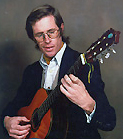 Hannemann’s Music Corner
Hannemann’s Music Corner Column by RICHARD HANNEMANN
Working Without a Net
Being a solo guitarist, whether you are doing straight instrumentals or vocal with instrumental accompaniment, is a tough gig.
You have no music stand or music in front of you because the music is supposed to be fully memorized: if it isn’t memorized it isn’t ready for performance.
You have no one you are working with. You have no one to cover you if you make a mistake. You are alone on the stage. It is just you and the audience – people you do not know and who are staring at you hanging on your every move and every note — and the only thing between you and them is the guitar.
This has been described as the high wire act of music working without a net.
Rule # 1 – Murphy will have his Moment. Beyond the likelihood of technical, equipment, or wardrobe malfunction you will, all by your lonesome, screw something up.
Rule # 2 – You cannot change Rule # 1. Accept this. Embrace this. It is your only hope.
Confidence is not a matter of knowing that you know what you are doing, nor that you believe that you can do something flawlessly.
Confidence comes from knowing that if something goes screwy, you can recover. Many people will say many nice things to you about a performance and you should always accept this with due modest pleasure.
But the best, highest, compliment you will ever get is from a fellow musician who, after a performance which was less than flawless, will say to you, “Nice save.”
I’ll tell you some of the stories later – and screwy performances make for some really good stories. For now, here are a few performance tips:
- Know your licks and really know your music;
- Do not go gentle into that good night – you might wind up doing deer in headlight.; and
- Any mess you can play yourself into, you can play yourself out of. So keep on playing. No matter what.
There are no wrong notes. Surprised? There may be an unintended note, or chord, but consider it kismet. You are there – the unintended notes are there – go with it. Learn to turn a wrong note into an opportunity.
This is where “really know your music” comes in handy. If you lose your spot, or miss the note, or hit a note that isn’t there pause long enough for your brain to catch up and think how to do a bit of re-composing and re-arranging to work the mistake into the piece as if it really was intentional.
If Segovia can do this (and I’ve seen him do it), so can you. Of course, if you really screw things up you might have to do a lot of re-composing but afterwards you can call the thing Variations on a Theme.
The audience is your friend. No matter the venue, you are doing nothing more than sitting around the living room with a few friends doing a few tunes. Keep this in mind.
Do not imagine the audience naked. You might succeed and the image will throw you off more than your jittery nerves will.
Do not look past your audience at a blank wall. You will wind up with a blank expression and they will know.
Make eye contact with your audience. Okay, don’t do the snake-looking-at-the-mouse stare; that’ll make them nervous. Do a roving scan, making brief, friendly, eye-contact with each as you pass by. I did a gig at the Century City Plaza which is every bit as large as the Santa Fe Plaza (or larger.)
After I was done a fellow came up and said, “I was sitting at the far side of the plaza and I felt like I was at a small café and you were at my table playing only for me.” That’s the goal.
It frankly takes enough gaul to be divided into three parts to walk on a stage and do something that has a high failure possibility. On the other hand when everything goes right, when you pour everything you have into what you play, then the audience will absorb it, magnify it, and send it back to you.
This creates a wonderful feed back loop and you will be able to do things on stage that you could never do at home. When that happens, to heck with caution, go with it.
Play music you personally enjoy and believe in. Anything else is dishonest and the audience will know. If it means nothing to you, it will mean even less to them.
The size of your audience doesn’t matter. One or one thousand its still the same music and the same you. Play for the one as if he or she was the one thousand; play for the one thousand as if they each were the one.
It has been said, “you are only as good as your last performance.” You haven’t done your last performance yet, which means you can only get better. The best is yet to come.

